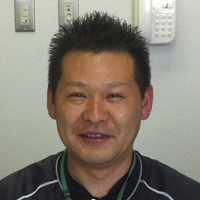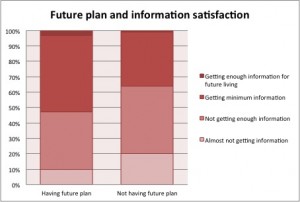Speaker: Chika SHISHIDO
Freelance radio personality

About half a year after I sought refuge in Hokkaido I was asked by a certain guy one day: “Chika, you’re against nuclear power, aren’t you?” Skateboard in one hand, T-shirt, shorts, cap on. He was about the same age as me or perhaps a bit older. I’m not sure if he was just repeating the latest slogan, and there was no deep meaning nor ill will in his words, but I felt a very strange discomfort I had never experienced before.
From Fukushima to Hokkaido
I was born and bred in Fukushima. I’m friends with a lot of the young girls there. After graduating from high school I was working as a campaign girl when I learnt of a new free community magazine called Dip. I didn’t really like Fukushima before I got involved with the magazine, but working there made me see the beauty of Fukushima and I came to like it.
I met people, saw the beauty of the place, and conveyed this in my own words. People said thanks and smiled at me, and this in turn made me smile. The interaction was a lot of fun and for seven years I conveyed the attraction of Fukushima and its people. I started editing and in the spring of my fifth year I also started working in radio, feeling that writing was not enough. I began working on a plan with my colleagues and the people of Fukushima as to how to go about making it a more fun place to live.
It was just when I came to love Fukushima that the earthquake and tsunami hit. Radiation filled the air and I was put into a situation where I had to choose whether to continue to live there or not. My work in radio and magazines was more important than ever, but I was surrounded by uncertainty and all kinds of information. I started collating information myself and gazed at the scary situation in front of me. After a lot of consideration and worrying, I decided to put my body first and the new life that I hoped to conceive one day. I tearfully threw away everything I had worked on over the years and moved to Hokkaido by myself, prepared to work in a convenience store or do other part-time work. Women taking refuge by themselves were very rare and I finally moved to Hokkaido in December last year. Asking me if I were against nuclear power? Honestly I thought that was a dumb question more than anything else.
Changes in values brought about by the disaster
This discomfort was not just an emotional response. I think the most emotional part lay in a change in values of late. Being eco-friendly, movements to preserve traditional and regional cuisines, minimalist lifestyles, pursuing barrier-free universal design…The tendencies to think of the earth, society, other living creatures, to co-exist with them and to not prioritize the economy or yourself, had been around for some time. Buzz words such as konkatsu (looking for a spouse) or arasa (being around 30 years of age) came onto the scene, but choosing how you live your life was surely nothing new. Having said that I wonder if some trends haven’t picked up pace since the earthquake and tsunami. I feel that topics that were barely talked about before the earthquake and tsunami are getting more focus within the context of life in Tohoku.
To make a comparison, take the traditional image of businessmen and women. They worked overtime or spent time with colleagues until late every night. Work was first priority and home life or private time was brief. More joy was felt in contributing to the company and the economy rather than by spending time with family or friends.
But what is it like in the affected regions after the disaster? Leaders who have seen with their own eyes the importance of life consider this the most important thing and are doing their utmost to help families, communities and regions. They appreciate the connections they have and enjoy spending time with people important to them, even if it means not having much money.
I could change the comparison to one about where young people gather and I could say the same thing. The leaders who dressed themselves in fashion and identified themselves through their appearance would not concern themselves with politics or the community, shrugging it off saying that nothing would change no matter what they did. I remember the high pride and it not being cool to approach difficult or bothersome issues. I’m embarrassed to say that I too was a part of that.
Now a year and a half later me and my friends who moved their families out of Fukushima wear old T-shirts and shorts as we head for the coast to serve free meals, joking that the elderly there would miss us if we didn’t go. Those with individuality have energy and gather information themselves, form their own ideas and while searching for various methods of expression, take action. I started a group made up of Fukushima girls called Peach Heart which connects Hokkaido with Fukushima, and I’d be happy if people consider what I – someone who didn’t even know how many nuclear reactors Fukushima had – am doing is one of these forms of action.
I guess you can tell what I’m talking about now. What I felt in the question from the guy at the beginning of this story was a sense of being behind the times. What I didn’t feel in that casual remark of “Chika, you’re against nuclear power, aren’t you?” was an interest in society, an opinion of his own, nor consideration for me. I don’t blame him however. I regret that I wasn’t more interested until I found myself in this position of considering life and death, and it was only then that I began thinking and acting for myself. I have also learned the absurdity of attempting to force my opinions on others. Thinking about Japan’s future and the recovery of affected areas including Fukushima, the age when it was cool to not have an opinion or not be interested was washed away with the tsunami. I really feel that mood has taken root especially in the affected areas.
A new way to live
Before the earthquake and tsunami all I talked about with my friends was parties and the comic One Piece, but my conversations with them now are about girls from Fukushima and how we can connect and support each other. As for men I find interesting, rather than appearance I prefer a strong set of beliefs and a willingness to tackle life and societal problems head on. I think I could live my life with that sort of person. I’m impressed if he attempts to understand local sentiment even though he’s not from Fukushima, and if he says he likes Fukushima I enjoy myself and have more drinks.
For those who move forward with Fukushima, topics such as work, romance, marriage, radiation and so on are inseparable and are with us for life. That is not to say that this is limited to Fukushima nor the issues of radiation and nuclear power. There are any number of problems that need to be solved in the future, involving the environment, disabilities and discrimination, taking care of those in need of care, food supplies etc. Some people say that we have entered a tough era. But we can’t go back to before the disaster and it is something which impacts everyday life now, the question is how can we turn it into something positive. It is a chance for the younger generation to show what they can do.
Enjoy life at the turning point of this period, while making choices with your own ideas. Respect each others choices and support friends and loved ones to get through this tough patch. That, I think, is the new way to live, changing slowly as a result of the disaster.
(Translated by Nate Hill)
Tweet




